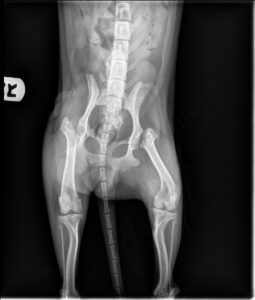
A femoral head ostectomy (FHO) is a surgery that focuses on restoring pain-free mobility to a damaged or diseased hip by eliminating the head and neck of the dog’s femur.
A femoral head ostectomy (FHO) is a surgery that focuses on restoring pain-free mobility to a damaged or diseased hip by eliminating the head and neck of the dog’s femur, also known as long leg bone or thighbone. There are several reasons why a pet may benefit from removing the femoral head and neck. Mount Carmel Animal Hospital provides readers with more information regarding the FHO surgery. We serve the following locations for our furry patients: Southern York County, PA; Monkton, MD; Northern Baltimore, MD; Carroll County, MD; and Harford County, MD.
What is FHO Surgery?
When your pet’s hip becomes diseased or damaged, their mobility can be affected. For instance, the joint’s degree of movement can decrease, leading to chronic pain and inflammation. Fortunately, a femoral head ostectomy restores mobility to the hip by eliminating the head of the femur. This eliminates the ball of the ball-and-socket joint, leaving only an empty socket. Over time, scar tissue will develop between the femur and acetabulum (the “socket” part of the pelvis) to provide cushioning, referred to as a “false joint.”
What Should You Expect the Day of FHO Surgery?
You will take your dog to the veterinarian in the morning on the day of the femoral head ostectomy surgery. You most likely will have to withhold food the morning of the surgery to prevent any vomiting that might occur under anesthesia. Your pet will spend most of the day at the hospital. This will allow the veterinary staff to monitor your pet after anesthesia as well as provide adequate pain control throughout the day. When you pick up your dog from the hospital, your pet probably will not be able to support any weight on the impacted leg. Some vets use dissolving sutures that are inserted under the skin. Your dog will likely be wearing a cone to prevent licking at the surgical site. You will be sent to your home with specific instructions for aftercare. Also, you will be sent home with pain medication and likely an antibiotic to prevent infection from occurring.
Post Operative Care
Care after an FHO surgery depends on the specific patient’s needs, but most post-operative recovery can be divided into two phases. In the first couple of days post-operatively, the focus will be mainly on pain control since the bones and muscles are cut during the procedure. Prescribed medications, warm compresses, and icing are recommended to minimize inflammation and encourage healing.
Your vet will likely recommend more, but still restricted, physical activity one week after surgery. The focus shifts to rebuilding muscle strength and mass. Keeping your pet mobile will help keep the scar tissue from forming too tightly, allowing your dog to remain flexible. You need to be careful not to let your pet overdo it as they heal, though. This is why walking should be slow to encourage your furry companion to bear weight on the affected leg but not overexert the area. Aquatic therapy is ideal for helping pets return to normal or remain healthy. As part of our comprehensive approach to the patients, Mount Carmel Animal Hospital offers a multimodal approach to physical therapy including an underwater treadmill, cold laser therapy, PEMF, and land exercises. All of these are great for patients recovering from surgery or injury, managing chronic conditions, or making the best out of their senior years!
Prognosis
Most dogs recover completely after FHO surgery and regain normal function of the affected leg. Even though the leg might have a slightly decreased limb length or range of motion after surgery, these impacts are usually minimal and don’t impact the pet’s quality of life.
HERE AT MOUNT CARMEL ANIMAL HOSPITAL, WE’LL TREAT YOUR PETS LIKE FAMILY!
Mount Carmel Animal Hospital has been serving the Northern Baltimore/Southern York community for over 30 years and is proud to be an independently operated, small animal practice committed to excellence in veterinary medicine and client service. From grooming to wellness services, along with Canine Life Skills Training Courses, and surgical procedures, we have the expertise that will best serve the needs of you and your pet. Contact us at 410-343-0200 and follow us on Facebook
